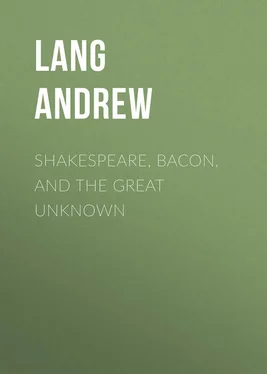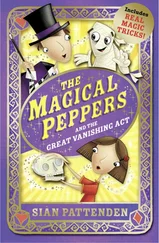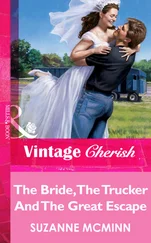Andrew Lang - Shakespeare, Bacon, and the Great Unknown
Здесь есть возможность читать онлайн «Andrew Lang - Shakespeare, Bacon, and the Great Unknown» — ознакомительный отрывок электронной книги совершенно бесплатно, а после прочтения отрывка купить полную версию. В некоторых случаях можно слушать аудио, скачать через торрент в формате fb2 и присутствует краткое содержание. Жанр: foreign_antique, foreign_prose, на английском языке. Описание произведения, (предисловие) а так же отзывы посетителей доступны на портале библиотеки ЛибКат.
- Название:Shakespeare, Bacon, and the Great Unknown
- Автор:
- Жанр:
- Год:неизвестен
- ISBN:нет данных
- Рейтинг книги:4 / 5. Голосов: 1
-
Избранное:Добавить в избранное
- Отзывы:
-
Ваша оценка:
- 80
- 1
- 2
- 3
- 4
- 5
Shakespeare, Bacon, and the Great Unknown: краткое содержание, описание и аннотация
Предлагаем к чтению аннотацию, описание, краткое содержание или предисловие (зависит от того, что написал сам автор книги «Shakespeare, Bacon, and the Great Unknown»). Если вы не нашли необходимую информацию о книге — напишите в комментариях, мы постараемся отыскать её.
Shakespeare, Bacon, and the Great Unknown — читать онлайн ознакомительный отрывок
Ниже представлен текст книги, разбитый по страницам. Система сохранения места последней прочитанной страницы, позволяет с удобством читать онлайн бесплатно книгу «Shakespeare, Bacon, and the Great Unknown», без необходимости каждый раз заново искать на чём Вы остановились. Поставьте закладку, и сможете в любой момент перейти на страницу, на которой закончили чтение.
Интервал:
Закладка:
Andrew Lang
Shakespeare, Bacon, and the Great Unknown
PREFACE
It is with some hesitation that I give my husband’s last book to the world. It was in type when he died, but he had no time to correct even the first proofs, and doubtless he would have made many changes, if not in his views at least in his expression of them. Mr. Bartram has verified the quotations and dates with infinite care, and for this he has my warmest thanks. For the rest I can but ask those who differ from the author to remember the circumstances in which the work has been published.
L. B. L.INTRODUCTION
The theory that Francis Bacon was, in the main, the author of “Shakespeare’s plays,” has now been for fifty years before the learned world. Its advocates have met with less support than they had reason to expect. Their methods, their logic, and their hypotheses closely resemble those applied by many British and foreign scholars to Homer; and by critics of the very Highest School to Holy Writ. Yet the Baconian theory is universally rejected in England by the professors and historians of English literature; and generally by students who have no profession save that of Letters. The Baconians, however, do not lack the countenance and assistance of highly distinguished persons, whose names are famous where those of mere men of letters are unknown; and in circles where the title of “Professor” is not duly respected.
The partisans of Bacon aver (or one of them avers) that “Lord Penzance, Lord Beaconsfield, Lord Palmerston, Judge Webb, Judge Holmes (of Kentucky, U.S.), Prince Bismarck, John Bright, and innumerable most thoughtful scholars eminent in many walks of life , and especially in the legal profession .. ” have been Baconians, or, at least, opposed to Will Shakspere’s authorship. To these names of scholars I must add that of my late friend, Samuel Clemens, D.Litt. of Oxford; better known to many as Mark Twain. Dr. Clemens was, indeed, no mean literary critic; witness his epoch-making study of Prof. Dowden’s Life of Shelley , while his researches into the biography of Jeanne d’Arc were most conscientious.
With the deepest respect for the political wisdom and literary taste of Lord Palmerston, Prince Bismarck, Lord Beaconsfield, and the late Mr. John Bright; and with every desire to humble myself before the judicial verdicts of Judges Holmes, Webb, and Lord Penzance; with sincere admiration of my late friend, Dr. Clemens, I cannot regard them as, in the first place and professionally, trained students of literary history.
They were no more specially trained students of Elizabethan literature than myself; they were amateurs in this province, as I am an amateur, who differ from all of them in opinion. Difference of opinion concerning points of literary history ought not to make “our angry passions rise.” Yet this controversy has been extremely bitter.
I abstain from quoting the “sweetmeats,” in Captain MacTurk’s phrase, which have been exchanged by the combatants. Charges of ignorance and monomania have been answered by charges of forgery, lying, “scandalous literary dishonesty,” and even inaccuracy. Now no mortal is infallibly accurate, but we are all sane and “indifferent honest.” There have been forgeries in matters Shakespearean, alas, but not in connection with the Baconian controversy.
It is an argument of the Baconians, and generally of the impugners of good Will’s authorship of the plays vulgarly attributed to him, that the advocates of William Shakspere, Gent, as author of the plays, differ like the Kilkenny cats among themselves on many points. All do not believe, with Mr. J. C. Collins, that Will knew Sophocles, Euripides, and Æschylus (but not Aristophanes) as well as Mr. Swinburne did, or knew them at all – for that matter. Mr. Pollard differs very widely from Sir Sidney Lee on points concerning the First Folio and the Quartos: my sympathies are with Mr. Pollard. Few, if any, partisans of Will agree with Mrs. Stopes (herself no Baconian) about the history of the Stratford monument of the poet. About Will’s authorship of Titus Andronicus , and Henry VI , Part I, the friends of Will, like the friends of Bacon, are at odds among themselves. These and other divergencies of opinion cause the Baconians to laugh, as if they were a harmonious circle..! For the Baconian camp is not less divided against itself than the camp of the “Stratfordians.” Not all Baconians hold that Bacon was the legitimate son of “that Imperial votaress” Queen Elizabeth. Not all believe in the Cryptogram of Mr. Ignatius Donnelly, or in any other cryptograms. Not all maintain that Bacon, in the Sonnets, was inspired by a passion for the Earl of Essex, for Queen Elizabeth, or for an early miniature of himself. Not all regard him as the author of the plays of Kit Marlowe. Not all suppose him to be a Rosicrucian, who possibly died at the age of a hundred and six, or, perhaps, may be “still running.” Not all aver that he wrote thirteen plays before 1593. But one party holds that, in the main, Will was the author of the plays, while the other party votes for Bacon – or for Bungay, a Great Unknown. I use Bungay as an endearing term for the mysterious being who was the Author if Francis Bacon was not. Friar Bungay was the rival of Friar Bacon, as the Unknown (if he was not Francis Bacon) is the rival of “the inventor of Inductive reasoning.”
I could never have expected that I should take a part in this controversy; but acquaintance with The Shakespeare Problem Restated (503 pp.), (1908), and later works of Mr. G. G. Greenwood, M.P., has tempted me to enter the lists.
Mr. Greenwood is worth fighting; he is cunning of fence, is learned (and I cannot conceal my opinion that Mr. Donnelly and Judge Holmes were rather ignorant). He is not over “the threshold of Eld” (as were Judge Webb and Lord Penzance when they took up Shakespearean criticism). His knowledge of Elizabethan literature is vastly superior to mine, for I speak merely, in Matthew Arnold’s words, as “a belletristic trifler.”
Moreover, Mr. Greenwood, as a practising barrister, is a judge of legal evidence; and, being a man of sense, does not “hold a brief for Bacon” as the author of the Shakespearean plays and poems, and does not value Baconian cryptograms. In the following chapters I make endeavours, conscientious if fallible, to state the theory of Mr. Greenwood. It is a negative theory. He denies that Will Shakspere (or Shaxbere, or Shagspur, and so on) was the author of the plays and poems. Some other party was, in the main , with other hands, the author. Mr. Greenwood cannot, or does not, offer a guess as to who this ingenious Somebody was. He does not affirm, and he does not deny, that Bacon had a share, greater or less, in the undertaking.
In my brief tractate I have not room to consider every argument; to traverse every field. In philology I am all unlearned, and cannot pretend to discuss the language of Shakespeare, any more than I can analyse the language of Homer into proto-Arcadian and Cyprian, and so on. Again, I cannot pretend to have an opinion, based on internal evidence, about the genuine Shakespearean character of such plays as Titus Andronicus , Henry VI , Part I, and Troilus and Cressida . About them different views are held within both camps.
I am no lawyer or naturalist (as Partridge said, Non omnia possumus omnes ), and cannot imagine why our Author is so accurate in his frequent use of terms of law – if he be Will; and so totally at sea in natural history – if he be Francis, who “took all knowledge for his province.”
How can a layman pretend to deal with Shakespeare’s legal attainments, after he has read the work of the learned Recorder of Bristol, Mr. Castle, K.C.? To his legal mind it seems that in some of Will’s plays he had the aid of an expert in law, and then his technicalities were correct. In other plays he had no such tutor, and then he was sadly to seek in his legal jargon. I understand Mr. Greenwood to disagree on this point. Mr. Castle says, “I think Shakespeare would have had no difficulty in getting aid from several sources. There is therefore no prima facie reason why we should suppose the information was supplied by Bacon.”
Читать дальшеИнтервал:
Закладка:
Похожие книги на «Shakespeare, Bacon, and the Great Unknown»
Представляем Вашему вниманию похожие книги на «Shakespeare, Bacon, and the Great Unknown» списком для выбора. Мы отобрали схожую по названию и смыслу литературу в надежде предоставить читателям больше вариантов отыскать новые, интересные, ещё непрочитанные произведения.
Обсуждение, отзывы о книге «Shakespeare, Bacon, and the Great Unknown» и просто собственные мнения читателей. Оставьте ваши комментарии, напишите, что Вы думаете о произведении, его смысле или главных героях. Укажите что конкретно понравилось, а что нет, и почему Вы так считаете.












